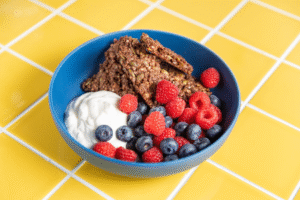Gluten Induced Fatigue
There can be a wide range of symptoms associated with gluten ingestion. These vary by individual and can include gastrointestinal symptoms such as constipation, diarrhoea, bloating and stomach cramps; dermatological symptoms such as rashes and itching skin; and also neurological symptoms like headaches and brain fog. But arguably one of the most debilitating for those of us with a gluten related condition, is experiencing gluten induced fatigue[1].
In a 2014 study where non-coeliac gluten sensitive (NCGS) participants underwent a controlled gluten challenge, it was demonstrated that the most significant finding in regards to the patient’s symptoms was an increase in fatigue[2]. It was later determined that of the participants who went back on to their strictly controlled gluten free diet, 27.5% displayed a marked improvement in their overall energy levels. This study thus demonstrated that, ‘in patients currently attempting a gluten free diet, excellent adherence was associated with significant improvement of fatigue (p<0.03)’.
This shows that accidental gluten ingestion or gluten cross-contamination – commonly experienced by those managing a gluten-free diet – would significantly contribute to feelings of gluten-induced tiredness and fatigue. As many people have busy lives, families and jobs, experiencing this fatigue can make every day tasks become challenging and frustrating. With the most common symptoms including lack of energy, difficulty concentrating and bodily aches, gluten-induced fatigue can heavily reduce an individual’s quality of life.
How can gluten induced fatigue be avoided?
The most obvious way to avoid gluten induced fatigue is to avoid gluten all together in your diet. While this may sound simple enough, the smallest amount of gluten such as from cross-contamination or accidental gluten ingestion (being ‘glutened’) can have a large effect on mental capacity and bodily functions. As revealed in a 2016 study published in Alimentary Pharmacology and Therapeutics, 91% of participants – all of whom had various gluten related disorders – reported that they experienced gluten exposure at least once per month3, indicating accidental gluten exposure to be an all too common problem.
So, what else can be done to help with gluten induced fatigue and reduce this possibility of being ‘glutened’?
The use of enzyme supplementation, such as GluteGuard, can be helpful as an extra layer of protection against inadvertent gluten ingestion and the symptoms that follow. Supported by clinical studies, GluteGuard’s patented enzyme action, Caricain, helps to break down gluten before it interacts with the intestinal lining, helping to protect against the symptoms that would normally follow. GluteGuard provides an extra layer of protection, and some peace of mind knowing that if the inevitable happens, GluteGuard’s enzymes are there to break down gluten that could be hiding in your meal.
“After accidentally eating gluten, I would wake up the following day feeling like I had been hit by a truck. I would have a headache and a lot of body pain plus chronic fatigue. The first time I took GluteGuard before a potentially gluten-containing meal, I was surprised to find I felt fine, no headache or inflammation or feeling ‘fluey’… This product not only works but also has helped me to identify that my chronic fatigue is actually from a gluten sensitivity” – Mel (verified owner) – December 3, 2016.
References:
[1] Anderson, J 2017, ‘how you can cope with fatigue caused by gluten’, VeryWell, [https://www.verywell.com/fatigue-caused-by-gluten-how-you-can-cope-562318].
[2] Herfath, H, Martin, C, Sandler, R, Kappelman, M, Long, M 2015, ‘Prevalence of a gluten-free diet and improvement of clinical symptoms in patients with inflammatory bowel diseases’, Inflammatory Bowel Diseases, 20(7), pp.1194-1197.
[3] Silvester J, et al, ‘Symptomatic suspected gluten exposure is common among patients with coeliac disease on a gluten-free diet’. (2016) 44 Alimentary Pharmacology and Therapeutics 612–619.
Contributer: Georgie, Glutagen.











